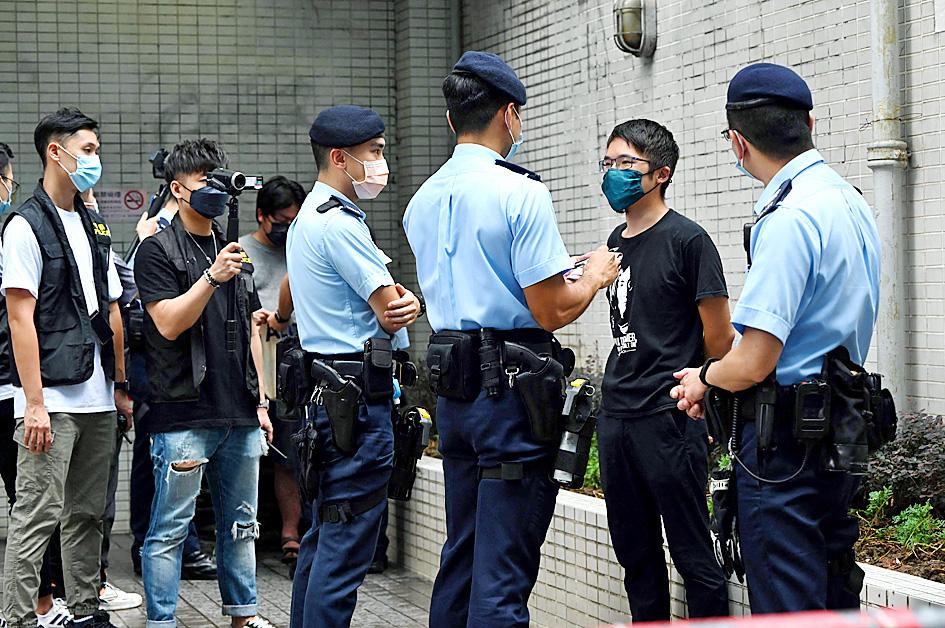Hong Kong’s political elite yesterday began selecting a powerful committee to choose the territory’s next leader and nearly half the legislature under a new “patriots only” system imposed by Beijing.
The territory has never been a democracy — the source of years of protests — but a small and vocal opposition was tolerated after its 1997 handover from the UK.
Huge democracy rallies exploded two years ago and Beijing responded with a crackdown and a new political system where only those deemed loyal are allowed to stand for office.

Photo: AFP
The first poll under that new system — carrying the slogan “Patriots rule Hong Kong” — took place yesterday as members of the territory’s ruling classes cast votes for a 1,500-seat Election Committee.
In December, that committee is to appoint 40 of the territory’s 90 legislators — 30 others are to be chosen by special interest groups and just 20 are to be directly elected. Next year, it is set to pick Hong Kong’s next Beijing-approved leader.
Beijing says the new political system is more representative and would ensure “anti-China” elements are not allowed into office.
Critics say it leaves no room for the pro-democracy opposition, turning Hong Kong into a mirror of the authoritarian Chinese Communist Party-ruled mainland.
“Hong Kongers are completely cut off from electoral operations,” said Nathan Law (羅冠聰), a prominent democracy leader who fled to the UK last year. “All election runners will become puppet showmen under Beijing’s entire control ... with no meaningful competition.”
Ted Hui (許智?), a former Hong Kong lawmaker and democracy advocate who moved to Australia, said Hong Kong’s political system is now “a rubber-stamp game completely controlled by Beijing.”
“It’s more than a managed democracy. It’s an autocracy trying to pretend to be civilized,” Hui said.
In 2016, about 233,000 Hong Kongers were allowed to select the Election Committee.
That figure has now been trimmed to about 4,800 — 0.06 percent of Hong Kong’s 7.5 million population.
Police said 6,000 officers were on standby to ensure that there were no protests or disruptions.
When polls closed on Sunday evening, authorities said the turnout among the select group of electors was 86 percent.
“This is an important election, although the number of people eligible to join is not large,” Hong Kong Chief Executive Carrie Lam (林鄭月娥) told reporters, adding that the new system would ensure “anti-China troublemakers” would no longer be able to “obstruct” the government.
In the wake of the 2019 protests, civil society groups have also been prosecuted and dozens have disbanded.
The Confederation of Trade Unions — the territory’s largest pro-democracy labor organization with about 140,000 members — yesterday became the latest, announcing that it would dissolve next month.

NATIONAL SECURITY THREAT: An official said that Guan Guan’s comments had gone beyond the threshold of free speech, as she advocated for the destruction of the ROC China-born media influencer Guan Guan’s (關關) residency permit has been revoked for repeatedly posting pro-China content that threatens national security, the National Immigration Agency said yesterday. Guan Guan has said many controversial things in her videos posted to Douyin (抖音), including “the red flag will soon be painted all over Taiwan” and “Taiwan is an inseparable part of China,” while expressing hope for expedited “reunification.” The agency received multiple reports alleging that Guan Guan had advocated for armed reunification last year. After investigating, the agency last month issued a notice requiring her to appear and account for her actions. Guan Guan appeared as required,

A strong cold air mass is expected to arrive tonight, bringing a change in weather and a drop in temperature, the Central Weather Administration (CWA) said. The coldest time would be early on Thursday morning, with temperatures in some areas dipping as low as 8°C, it said. Daytime highs yesterday were 22°C to 24°C in northern and eastern Taiwan, and about 25°C to 28°C in the central and southern regions, it said. However, nighttime lows would dip to about 15°C to 16°C in central and northern Taiwan as well as the northeast, and 17°C to 19°C elsewhere, it said. Tropical Storm Nokaen, currently

‘NATO-PLUS’: ‘Our strategic partners in the Indo-Pacific are facing increasing aggression by the Chinese Communist Party,’ US Representative Rob Wittman said The US House of Representatives on Monday released its version of the Consolidated Appropriations Act, which includes US$1.15 billion to support security cooperation with Taiwan. The omnibus act, covering US$1.2 trillion of spending, allocates US$1 billion for the Taiwan Security Cooperation Initiative, as well as US$150 million for the replacement of defense articles and reimbursement of defense services provided to Taiwan. The fund allocations were based on the US National Defense Authorization Act for fiscal 2026 that was passed by the US Congress last month and authorized up to US$1 billion to the US Defense Security Cooperation Agency in support of the

PAPERS, PLEASE: The gang exploited the high value of the passports, selling them at inflated prices to Chinese buyers, who would treat them as ‘invisibility cloaks’ The Yilan District Court has handed four members of a syndicate prison terms ranging from one year and two months to two years and two months for their involvement in a scheme to purchase Taiwanese passports and resell them abroad at a massive markup. A Chinese human smuggling syndicate purchased Taiwanese passports through local criminal networks, exploiting the passports’ visa-free travel privileges to turn a profit of more than 20 times the original price, the court said. Such criminal organizations enable people to impersonate Taiwanese when entering and exiting Taiwan and other countries, undermining social order and the credibility of the nation’s